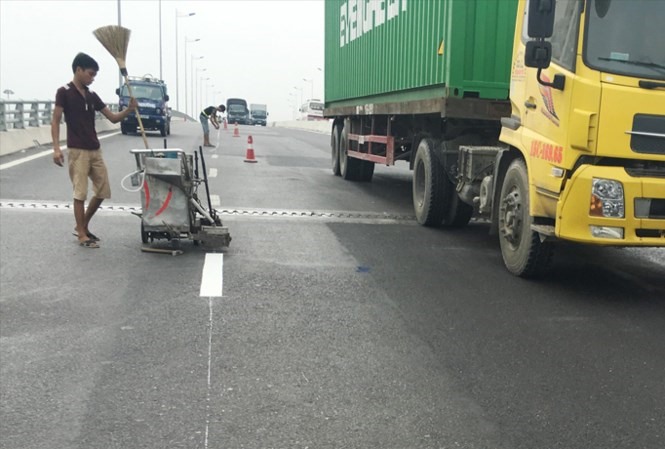Hanoi's People’s Committee has proposed 16 Build-Transfer (BT) projects with total investment of more than VNĐ130 trillion (US$5.6 billion) to the Government.

Road surface of Long Bien flyover is damaged right after the project was completed. This is one of seven projects that have committed violations. – Photo tienphong.vn
According to experts, the city should put up the projects for open bidding to select investors to avoid violations committed during the previous projects.
Among 16 BT projects proposed by chairman of the municipal People’s Committee Nguyen Duc Chung, there are 12 transport projects and four environment projects, including key projects worth trillions of đồng.
The city has suggested applying a specific mechanism, which means removing a series of procedures for investors.
Some infrastructure projects that have huge impact on the city’s socio-economic development and help solve traffic congestion must be implemented early. It takes a lot of time and the project’s progress may fall behind schedule if investors are selected following Bidding Law and Government’s decree, Chung said, adding there must be a specific mechanism for investor selection.
Several construction experts said most contractors of BT projects executed in Hanoi are appointed through a specific mechanism. However, Hanoi has not followed an efficient investor selection process and has not fully assessed the capacity of some investors. Some incapable investors were, therefore, still being selected, leading to violations.
“The projects applying a specific mechanism were said to be urgent, however, local authorities did not show their urgency when appointing investors,” a member of the Government Inspectorate (GI) told Tien Phong (Vanguard) newspaper.
Dr Doãn Minh Tâm, former head of the Transport Communication and Science Technology Institute, said investors of BT and Build-Operate-Transfer (BOT) projects must be selected through public bidding, although they will enjoy a specific mechanism.
However, all seven BT projects implemented in Hanoi in the past had their investors appointed and the State was finding it hard to select capable investors.
“This is the main reason leading to projects’ slow progress and cost overruns, as pointed out by the GI,” Tam said.
Nguyen Manh Quyen, director of Hanoi's Department of Planning and Investment, said public bidding will be held for the city’s Public-Private Partnership projects, including BT and BOT projects in the future, except for urgent projects or those under specific order of the Prime Minister.
In July this year, the GI released findings of egregious wrongdoing in the implementation of a number of BT and BOT infrastructure and environmental projects in Hanoi.
All BT projects were behind schedule and entailed significant cost overruns. GI said contractors were “not sufficiently capable of mobilising capital” and also blamed “failure to disburse budget in accordance with set schedule.”
Seven BT projects that caused massive loss are construction of the Yên Sở wastewater treatment plant, the Lê Văn Lương Road extension, the southern main road of Ha Tay and a street connecting Le Duc Tho, as well as new urban area Xuan Phuong, a road surrounding the Chu Van An memorial site and the Hanoi - Hung Yen interprovincial road. — VNS